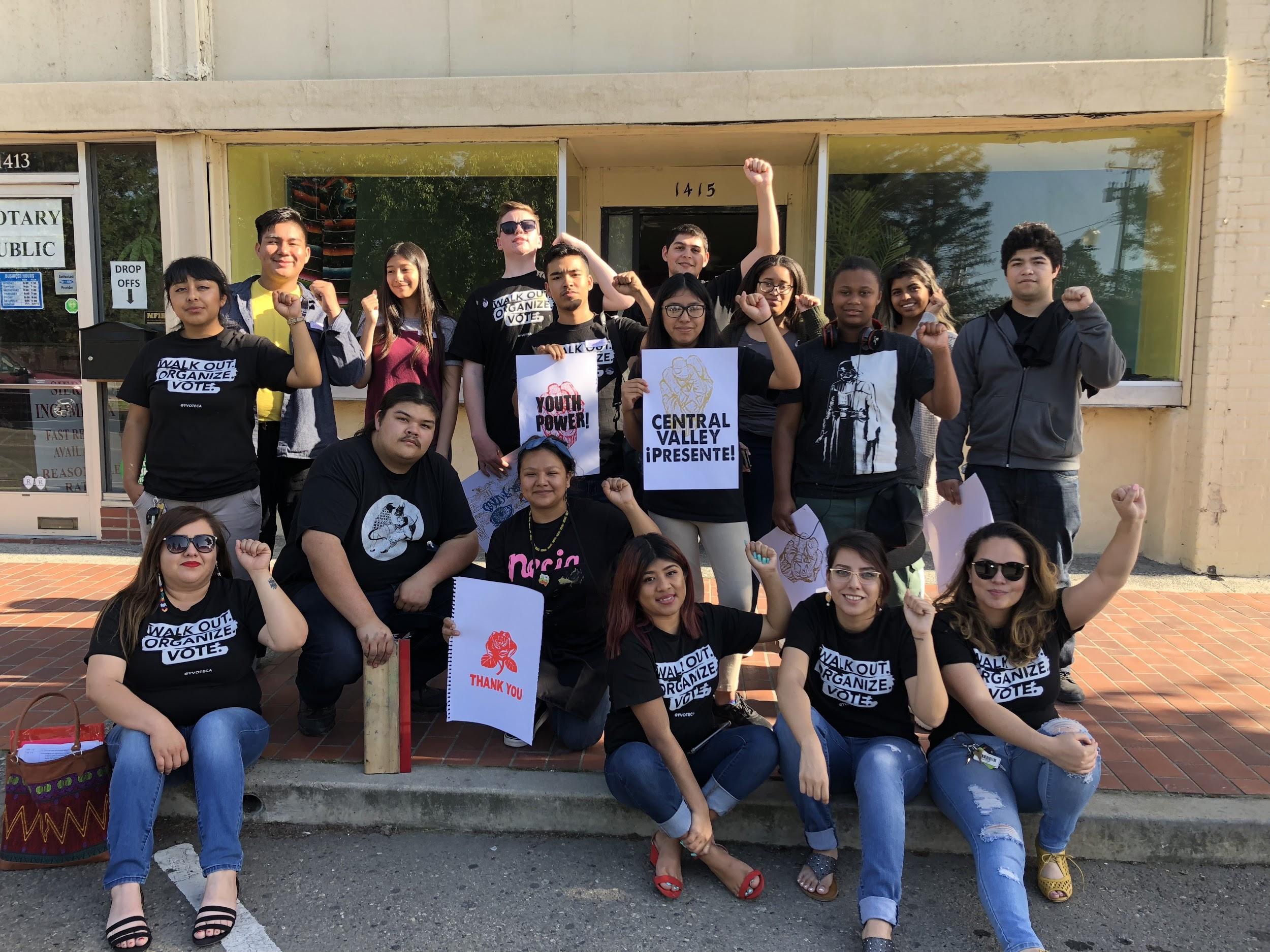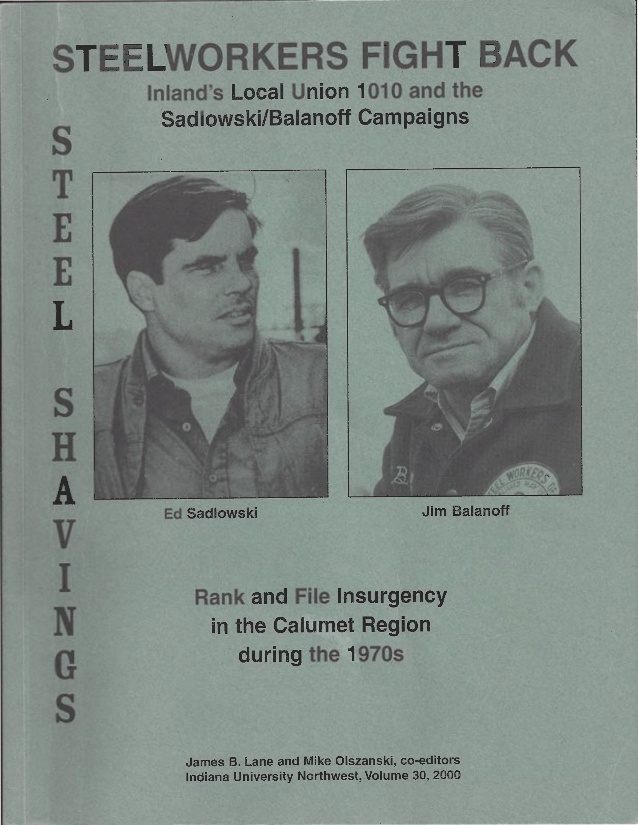Current IssueFrom the Editors
We wish our readers a Happy New Year, though we know that you take little joy in it, politically speaking. If we take no joy, we do sometimes find humor in President Donald J. Trump’s proclamations by Twitter, such as his claim that he is a “stable genius.” The current debate revolves around which of those two words is more ridiculous. Socialists, Democrats, the Working Class, and Our FutureWinter 2018
The question of the socialist left’s relationship to the Democratic Party has been a controversial
issue for decades, in truth, for as long as we have had the modern two-party system. At various
times the issue has been whether or not to break with the Democratic Party and construct a
socialist party or a labor party instead.
The Two Souls of Democratic Socialism
Fighting for the Soul of SocialismA Response to Kim Moody
Independent Politics Doesn’t Start With Walling Off the Democrats
I first met Kim Moody some 50 years ago. He was then organizing chapters of the California-based Peace and Freedom Party as an alternative to the Democratic war machine. If memory serves, he came to Park Slope, Brooklyn, then a predominantly Irish and Italian working-class neighborhood—not the gentrified picture from House Beautiful it has since morphed into—but also inhabited by a smattering of déclassé radicals. Moody wanted to interest a few of us in taking up the electoral mantle. Kim Moody Replies
Reply to Dornbush, Elliott-Negri, and LewisDornbush, Elliott-Negri, and Lewis are right that ideology is not enough and an analysis of “the actual, material terrain” is necessary. Simply repeating the well-known realities of the first-past-the-post U.S. electoral system that favors the two-party duality is not such an analysis. It’s old news. Not altogether wrong, but still yesterday’s political science. Trump and the Labor MovementA Look Beyond the Immediate Damage
We working people live in darkening times. When the Trump presidency ends in four years—if it does—we may no longer have an organized labor movement. As one of my colleagues, Ed Ott of the Murphy Institute, the City University of New York’s labor school, said to me, “We are at the beginning of the end of the U.S. labor movement based on a partnership with capital.” We are at the twilight of an era. Labor unions and collective bargaining stand to be swept away, and with them the institutions that have sheltered us in the workplace and provided us with a modicum of job security, living wages, health insurance, and pension benefits. The Environmental Justice Movement in South BaltimoreUnited Workers Take on the Multiple Crises of Capitalism
In an era when the federal government is increasingly dominated by fossil-fuel interests that limit regulation of oil rigs and pipelines, the environmental justice movement seems to have diminished significantly. Cuban Civil SocietyIts Present Panorama
A civil society emerges, mainly, due to citizens’ need to actively involve themselves in the public sphere in order to address processes that impact their daily lives and affect their interests. At the heart of civil society, various social actors, with sometimes remarkable differences, group themselves around common issues that affect or interest all of them. Therefore, civil society is plural, characterized by the spontaneous organization of citizens and based on logics of autonomy, solidarity, and representation of specific identities; it is aimed at addressing collective demands, exploring solutions to issues that affect a given community, and having an impact in the public sphere. Stalinism: The Complete Negation of Socialism
This is the last of three articles commemorating the Russian Revolution of 1917 and analyzing its fate under Stalin. The first part, “Glorious Harbinger of a New Society: The Bolshevik Revolution,” was published in New Politics, number 62, winter 2017, and the second part, “The Tragic Fate of Workers’ Russia,” in New Politics, number 63, summer 2017. The Third Camp, Socialism From Below, and the First Principle of Revolutionary Socialism
"The socialists consider it their principal, perhaps even their only, duty to promote the growth of this consciousness among the proletariat, which for short they call its class consciousness. The whole success of the socialist movement is measured for them in terms of the growth in class consciousness of the proletariat. Everything that helps this growth they see as useful to their cause; everything that slows it down as harmful." —George Plekhanov Remembering Joanne
Wholly Dedicated to Socialism From Below
The death of Joanne Landy last October is a profound loss to the socialist and internationalist movements.
Joanne died less than a day shy of her 76th birthday, and for her entire adult life, she retained a commitment to the fight for a more democratic and more humane world, and to the politics of socialism from below. Cartoon Cavalcade
In her award-winning book Red Rosa (2015), Kate Evans combined feminist biography, intellectual history, and appealing visuals to tell the remarkable story of Rosa Luxemburg. While much of the narrative focused on friendships, relationships, and personal struggles, Evans also conveyed a sense of Luxemburg as a theorist of capitalism, imperialism, and war. Comic Art in the Academy
The closing of the era when comic art specialists, not people with PhDs, wrote the outstanding and recognized works on individual artists and genres may have arrived as recently as only a few years ago. Careful biographies of artistic giants, household names (in their own eras, at least) or famed only within the field, Al Capp or Will Elder, have continued to be written by people who could rightly be called “fans”—if the title did not seem insulting. Rather than university presses, Fantagraphics or the comics series at Abrams would be a typical outlet. With each year that passes and with each swelling enrollment in a college course, the scene shifts. Exploitation and Modes of Production
The mode-of-production concept that Marx develops in Capital (although the idea is present earlier) is the essential methodological tool for understanding history, different societies, and the possibilities for social change. The Misrule of Global Capitalism
Social Inequality is not for the faint-hearted. It covers the major political-economic issues of our time, from the structural changes in the economics of capitalism, to class structure, the imperialist state, and the distortions of capitalist culture. The author, a veteran scholar-activist of the New Left generation who now lives in Costa Rica,1 ends with a plea for resistance to our oligarchic “hegemon” and suggests a series of tactics to help us on the road. Keynes, the Rabble, and Revolution
IN 1942 British economist John Maynard Keynes got an advance preview of Lord William Beveridge’s report, Social Insurance and Allied Services. In it, Beveridge proposed a comprehensive system of social security that ran the gamut from full employment to national health care so as to eliminate “Want, Disease, Ignorance, Squalor, and Idleness” from the United Kingdom. Socialism or Ecocide
Ecosocialism: A Radical Alternative to Capitalist Catastrophe, while excellent and valuable in its own right, isn’t quite the introduction to “green Marxism” that one might have expected. Michael Löwy is a veteran for decades of the democratic revolutionary left in France and a frequent contributor to New Politics. |
Blogs & On-Line Features#FreeRider and #Freeloader obscure labor’s challenges post-Janus
A 99Rootz Organizer's Story
Driving down Route 99 highway, miles upon miles of flat land sprouting grapes, nuts, lemons, and tomatoes line the stretch of land next to the hot asphalt. Highlighted within this landscape of farmland and truck filled, busy highways are youth. Strong, beautiful, Black and Brown young people unapologetically organizing amidst big agriculture and quiet towns. They are organizing for a Central Valley that provides all its residents with what they need to be whole. These young people, full of wisdom and fire, are ready to reclaim the region as their own, creating from the soil rich land a movement that pushes forward their vision of a California for all. At the center of this energy and youth-led, transformative movement is 99Rootz. Support the Popular Rebellion in Nicaragua – Oppose U.S. Intervention
At this moment, the government of President Daniel Ortega and his party, the Sandinista Front for National Liberation (FSLN or Sandinistas), face a popular rebellion from below on a national scale. We look here at the origins of this rebellion, at the alternatives facing it, and at the responsibilities of those of us in the United States toward the people of Nicaragua.
On the Mass Protests in Iran, Revolutionary Socialism, and International Solidarity
Below is the text of Frieda Afary’s presentation to a group of international labor activists on June 10, 2018. Alex Pareene: Pundit of the Century

Alex Pareene, first of Wonkette, then Gawker, then Salon, then back to Gawker, then a stillborn First Run Media project, and now Splinter News is a great pundit. Requiem for a SteelworkerMon Valley Memories of Oil Can Eddie
In progressive circles in the upper midwest today, if you’ve heard the name Sadlowski, it’s probably because you were involved in the Wisconsin labor uprising of 2011, where you might have linked arms with AFSCME organizer and state capitol occupier Edward A. Sadlowski. Or maybe you applauded the electoral victory of his sister, Susan Sadlowski Garza, when she won a Chicago city council seat four years later, as a standard bearer for her union, the Chicago Teachers. The Baqee Protest: A Way to Shock the Prince and His Billionaire Admirers
Saudi prince Salman dazzled Wall Street and the glitterati in his three-week U.S. tour this past March. The captains of finance (Stephen Schwartzman, Peter Thiel), tech (Gates, Bezos), politics (Trump, Clinton), and Hollywood (Disney’s Bob Iger, director James Cameron, Morgan Freeman) all met with him. “60 Minutes” did a fawning piece, as did NPR and the Atlantic. The New York Times printed two rapturous articles by Thomas Friedman. Finally, they had a marketable Saudi royal. Mohammad bin Salman was not the usual doddering nonagenarian, but a vigorous take-charge guy, who … get this… is going to let women drive! Phyllis Jacobson on Norman Podhoretz and Kenneth TynanFrom the New Politics archives
Reprinted from New Politics, Spring 1967, pages 95-97 Making It, by Norman Podhoretz, Random House, New York, 1967. 360 pp. $6.95. Tynan Left and Right by Kenneth Tynan, Atheneum, New York, 1967. 479 pp. $8.95.
Democracy and Ecological Crisis
Last fall 15,000 scientists issued a second dire notice to humanity that we are on a collision course with the limits of our planet. They concluded, “To prevent widespread misery, humanity must practice a more environmentally sustainable alternative to business as usual,” including “reassess[ing]... the role of an economy rooted in growth.” That means that we have to challenge capitalism; there is no capitalism without growth. Rosa Luxemburg’s statement on the eve of World War I that the choice is between socialism or barbarism was never more true. But today our struggle is about our very existence. What Do We Really Want Policing To Be?
Brooklyn College sociology professor Alex Vitale’s provocative new book, The End of Policing, comes amid the national debate about deadly force by police and the rise of the Black Lives Matter movement. But Vitale — one of the country’s fiercest advocates of police reform over the past 25 years — thinks police killings are a symptom of a much broader issue. As the coordinator of the Policing and Social Justice Project at Brooklyn, he argues that police in recent decades have taken on a “warrior mentality” that is fundamentally incompatible with the ideal of equal justice. And he thinks the solutions typically advocated by progressives are not the real answer. Following are edited excerpts of Vitale’s recent appearance on the CUNY Book Beat podcast. Revolution in a Warming World: Lessons from the Russian to the Syrian Revolutions
It doesn’t take much imagination to associate climate change with revolution. If the planetary order upon which all societies are built starts breaking down, how can they possibly remain stable? Various more or less horrifying scenarios of upheaval have long been extrapolated from soaring temperatures. Nicaragua: Where Is The Rebellion Going?
Roadblocks and possibilities: The Nicaraguan student insurrection
Canadian internationalist feminist Lori Hanson, who has been working in solidarity with rural Nicaraguans for more than 30 years, has just returned from Nicaragua. Jack Hicks interviewed her for New Socialist. Together, they crafted this piece based on the interview and an article Lori previously wrote for the Greek newspaper, AlterThess. The analysis of an emerging movement in Nicaragua is a work in progress for Lori, who continues to work with Nicaraguans on the deeper meaning of a 44 day-long uprising and the state violence that has accompanied it in April and May, 2018. Developing Marx’s Mode of Production Theory
It is not surprising that Karl Marx is having a comeback today, after the 2008 financial crisis, the growing awareness of capitalism’s propensity to crises and ecological problems, and the fact that global inequality has increased to an obscene degree – all of which Marx foresaw. Une déclaration sur le voyage de Mélenchon en Russie
This is a declaration signed by two French militants and a young Ukrainian left-wing activist describing the details of Jean-Luc Mélenchon's trip to Russia not long ago, and the scandal of the ignorance of part of the left under the pretext of anti-imperialism. |

 Some New Politics readers will recognize the title of this article as a paraphrase of Hal Draper’s “Two Souls of Socialism,” which appeared in New Politics in 1966. The first version, however, appeared in the socialist student magazine Anvil in 1960, just as a new generation of youthful activists was emerging, inspired to a large extent by the civil rights movement.
Some New Politics readers will recognize the title of this article as a paraphrase of Hal Draper’s “Two Souls of Socialism,” which appeared in New Politics in 1966. The first version, however, appeared in the socialist student magazine Anvil in 1960, just as a new generation of youthful activists was emerging, inspired to a large extent by the civil rights movement. After a huge bump in membership thanks to Bernie Sanders, and an even bigger one thanks to Donald Trump, the DSA continues to grow. Since its national convention in August, membership has increased from 25,000 to 30,000. We have known since 2011 that millennials have a more positive association with the word “socialism” than the word “capitalism”;1 Sanders gave this demographic shift from the cold war era a political expression, and DSA has given it an organizational expression. Now thousands on the left are scrambling to answer the question, “What do we do with this newfound energy?”
After a huge bump in membership thanks to Bernie Sanders, and an even bigger one thanks to Donald Trump, the DSA continues to grow. Since its national convention in August, membership has increased from 25,000 to 30,000. We have known since 2011 that millennials have a more positive association with the word “socialism” than the word “capitalism”;1 Sanders gave this demographic shift from the cold war era a political expression, and DSA has given it an organizational expression. Now thousands on the left are scrambling to answer the question, “What do we do with this newfound energy?”




 In June 2017, the New Politics editorial board organized an event to honor Joanne Landy. She had been diagnosed almost a year before with stage 4 lung cancer. We all knew her prognosis was very grim and thought it would be a fine thing to show Joanne, while she was still with us, how much she was loved and admired by so many, many people.
In June 2017, the New Politics editorial board organized an event to honor Joanne Landy. She had been diagnosed almost a year before with stage 4 lung cancer. We all knew her prognosis was very grim and thought it would be a fine thing to show Joanne, while she was still with us, how much she was loved and admired by so many, many people.

 The Supreme Court’s long-anticipated – and feared by progressives – decision outlawing the collection of fees in public employee unions equivalent to costs of collective bargaining was met with indignant or defiant words, rightly decrying this attack on organized labor. The response, though, has mirrored what has been missing in labor’s understanding of
The Supreme Court’s long-anticipated – and feared by progressives – decision outlawing the collection of fees in public employee unions equivalent to costs of collective bargaining was met with indignant or defiant words, rightly decrying this attack on organized labor. The response, though, has mirrored what has been missing in labor’s understanding of 








 The popular rebellion against the dictatorial government of Daniel Ortega, four-time president of Nicaragua, has been going on now for more than a month. And the Ortega government has continued its violent repression. In the last 47 days, it is reported that 104 people have been killed, while some have been arrested or tortured and others have gone missing. In one of the most atrocious events, government snipers fired on the May 30 “Mothers March” led by mothers mourning the murder of their children. Fifteen marchers were killed and scores wounded.
The popular rebellion against the dictatorial government of Daniel Ortega, four-time president of Nicaragua, has been going on now for more than a month. And the Ortega government has continued its violent repression. In the last 47 days, it is reported that 104 people have been killed, while some have been arrested or tortured and others have gone missing. In one of the most atrocious events, government snipers fired on the May 30 “Mothers March” led by mothers mourning the murder of their children. Fifteen marchers were killed and scores wounded.







 This essay was originally a talk at the conference held at the New School for Social Research on April 21-22, 2016.
This essay was originally a talk at the conference held at the New School for Social Research on April 21-22, 2016.